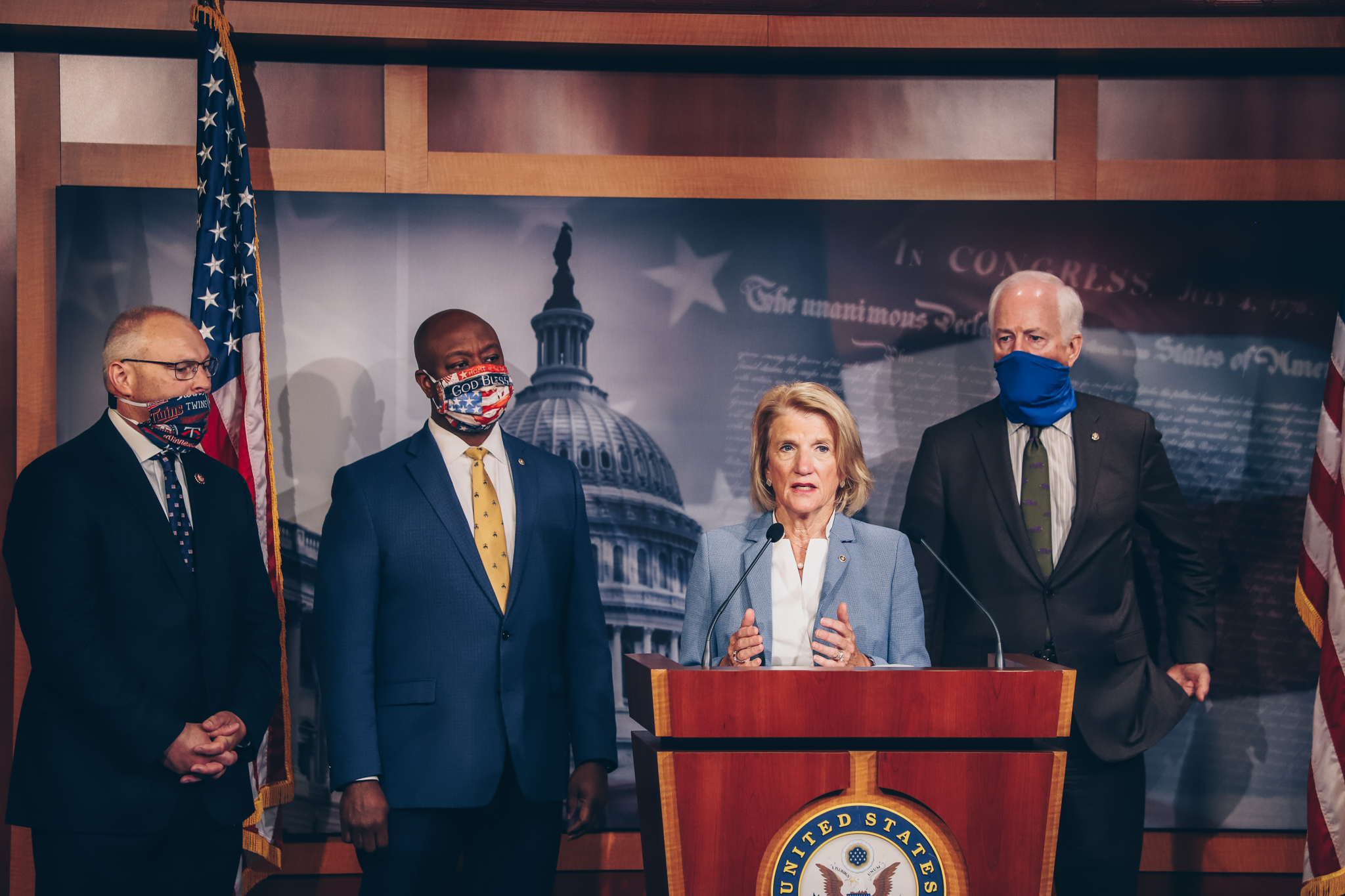MORGANTOWN — Sen. Shelley Moore Capito, R-W.Va. joined with Majority Leader Mitch McConell, R-Ky., and five other senators to announce introduction of the JUSTICE Act police reform bill. Capito followed that with a conference call with West Virginia reporters.
JUSTICE is an acronym for Just and Unifying Solutions to Invigorate Communities Everywhere.
Sen. Tim Scott, R-S.C. is the bill’s architect and African-American. “We know there are systemic issues and problems and we need to address them, and we need to address them together,” he said.
He’s been a victim of police profiling, he said, stopped seven times in a single year. And this year he was pulled over for not turning on his turn signal soon enough before a lane change.
Scott said that restoring the confidence of communities of color in institutions of authority is not a binary choice of supporting police or the communities of color. The majority of police are good people trying to keep order in their communities. This bill aims to achieve reform, accountability and transparency.
McConnell said he plans to bring the bill to the floor on June 24 for a procedural vote to act on it. That would allow for debate, amendments and a vote on the bill itself. The procedural vote, called cloture, requires 60 votes but he said he’s hoping for 100 as a sign both sides of the aisle want to talk about the issue together.
The full bill runs 106 pages. Here are some of its provisions:
Mandatory reporting of shootings by police to the FBI with a federal funding penalty for failure to reply. Currently, only 40% of police forces report them.
Mandatory reporting of “no-knock warrants” to the U.S. attorney general.
A de-facto national ban on choke holds by requiring state and local governments to ban them or face loss of grant funds.
Mandatory wearing and use of body cameras, with grant funding to supply cameras to agencies that need them.
Records retention on “bad apple” cops with incidents of discrimination, excessive force or other bad behavior. This would allow a force to do a background check on an officer seeking to transfer from another force.
Training in race sensitivity, situation deescalation and intervention. The need for intervention was evident, the senators said, in the George Floyd killing, where three officers stood by and watched Derek Chauvin kneel on Floyd’s neck.
Grants to encourage people of color to join police forces.
Makes lynching a federal crime.
Other issues, Scott and Capito said, aren’t in the bill but are open for discussion. Among them is qualified immunity, which shields officers from civil suits for violating constitutional rights unless the officers have violated the law. A rival House bill eliminates it; some Republicans are open to modifying it.
Congress is known for letting partisan bickering annihilate progress on legislation, but Senate Judiciary Chair Lindsey Graham, R-S.C., said Wednesday that Democrats communicated to him during a committee hearing that they want to reconcile their differences on this bill and get it passed.
During the phone conference, Capito said the bill is an effort to reform a policing system that doesn’t have justice equally for all. “I think it will go a long way toward improving law enforcement, and I think that will help us improve the perceptions and the trust communities of color are lacking in our law enforcement.”
The bill is also a better approach than the Defund the Police movement, she said. That movement aims to draw off funding from police forces and divert it to various social services with the view that it would free police from many of their social service duties that prevent them from enforcing the law.
Capito said a well-run law enforcement arm is necessary for society. She cited the example of the six-block CHAZ or CHOP zone in Seattle, where protesters took control after police abandoned their local headquarters, and where some patrol the borders with guns.
“The way to do that is not to step back and let people take over six blocks of a city and absolutely destroy property and businesses that individuals have built up their whole life and create their own law enforcement within that.”
The country needs strong law enforcement and strong civil rights protection, she said.
Capito said about 75% of the bill reflects measures already agreed to by both sides. The cloture motion will open full debate on the rest.
The Dominion Post asked Sen. Joe Manchin, D-W.Va. For his thoughts on the bill. Spokeswoman Sam Runyon said in an email exchange, “Sen. Manchin is encouraged by the national debate on police reforms. He is hopeful that Sen. McConnell is sincere and a genuine bipartisan process will move forward in the Senate with debate and votes on meaningful amendments.
“As it is currently written,” Runyon said, “the Republican proposal creates a series of commissions to study the problems but does not go far enough to address the issues raised by black Americans. He is committed to finding common ground on a pathway forward between this effort and the efforts of his democratic colleagues in the House and Senate.”
The commissions Manchin referenced included a Commission on the Social Status of Black Men and Boys and a National Criminal Justice Commission.
Tweet David Beard @dbeardtdp Email dbeard@dominionpost.com




